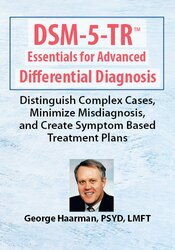

Getting the diagnosis right is where good mental health care begins.
But let’s face it – mental health symptoms don’t always fit neatly into boxes.
With so much overlap between disorders, even experienced clinicians can struggle to pinpoint the correct diagnosis. And when things get missed or misidentified, treatment suffers – clients don’t get the help they need, outcomes decline, and trust can take a hit.
That’s why we’ve put together this training with George Haarman, PsyD, LMFT, a nationally respected expert in diagnosis and treatment planning. This isn’t just a review – it’s a hands-on, case-based training designed to help you fine-tune your clinical judgement and stay sharp with the DSM-5-TR™.
You’ll learn how to:
Whether you’re just starting out or have years of experience, this training will give you the tools to make more accurate, culturally responsive diagnoses – and deliver the care your clients deserve.
Don’t miss it – purchase today!
*It may be helpful for participants to have a copy of DSM-5-TR™ available for reference.
Planning Committee Disclosure - No relevant relationships
All members of the С�����Ƶ. planning committee have provided disclosures of financial relationships with ineligible organizations and any relevant non-financial relationships prior to planning content for this activity. None of the committee members had relevant financial relationships with ineligible companies or other potentially biasing relationships to disclose to learners. For speaker disclosures, please see the faculty biography.
Continuing education credit information is coming soon for this non-interactive self-study package.
CE hours may be available for select professions, as listed in the target audience. Hours will be dependent on the actual recording time. Please check with your state licensing board or organization for specific requirements.
There may be an additional fee for CE certificates. Please contact our Customer Service at 1-800-844-8260 for more details.
**Materials that are included in this course may include interventions and modalities that are beyond the authorized practice of your profession. As a licensed professional, you are responsible for reviewing the scope of practice, including activities that are defined in law as beyond the boundaries of practice in accordance with and in compliance with your professions standards.

George B. Haarman, PsyD, LMFT, is a licensed clinical psychologist and a licensed marriage and family therapist with over 40 years of experience working in a variety of settings, including private practice, youth detention centers, juvenile group homes, child protective services, and juvenile probation. Dr. Haarman completed basic and advanced supervisor training required by the Kentucky Board of Psychology Examiners and maintains approval by the board to act as a supervisor. In his private practice, Dr. Haarman has provided clinical supervision to clinical and counseling practicum students as well as consultation about clinical supervision to psychologists for over 25 years. He is a national speaker on clinical supervision, depression, school refusal, ADHD, emotional disorders in children and adults and the DSM-5®. He is the author of three books: Clinical Supervision: Legal, Ethical, and Risk Management Issues, School Refusal: Children Who Can’t or Won’t Go to School, and Mastering DSM-5®. Dr. Haarman received his doctorate in clinical psychology from Spalding University in 1989. He has been an instructor at Jefferson Community College, Bellarmine University, and Spalding University.
Speaker Disclosures:
Financial: Dr. George Haarman maintains a private practice and is an adjunct professor Spalding University, Jefferson Community College, and Bellarmine University. He receives a speaking honorarium and recording royalties from С�����Ƶ. He has no relevant financial relationships with ineligible organizations.
Non-financial: Dr. George Haarman is a member of the American Psychological Association and the Kentucky Psychological Association.
Access never expires for this product.
Visit our FAQ page at www.pesi.com/faq or contact us at www.pesi.com/info
History and Development of the DSM®
New Diagnosis in the DSM-5-TR™
Criteria Changes in DSM-5-TR™ and What it Means for You
Utilizing DSM-5-TR™ Symptoms in Treatment Planning
Differential Diagnosis
Case Studies and Treatment Plans
Satisfaction Guarantee
Your satisfaction is our goal and our guarantee. Concerns should be addressed to: PO Box 1000, Eau Claire, WI 54702-1000 or call 1-800-844-8260.
ADA Needs
We would be happy to accommodate your ADA needs; please call our Customer Service Department for more information at 1-800-844-8260.
С�����Ƶ Mobile App
Access CE trainings on your phone or tablet through our free mobile app. Choose video or audio-only versions of online courses from the world’s best instructors, and complete your CE requirements anywhere, anytime, at your own pace.
Please wait ...